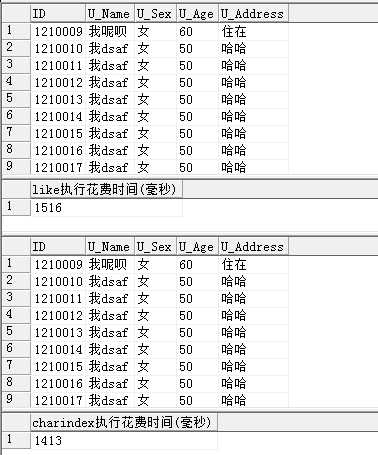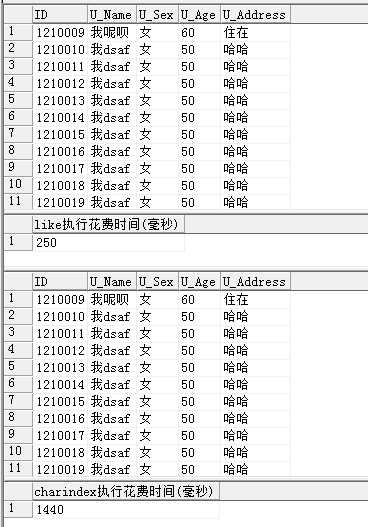标签:
原文链接:http://www.cnblogs.com/New-world/archive/2012/11/28/2793560.html
MS_SQL模糊查询like和charindex的对比
like查询效率低下,网上搜了一下替代like查询的方法,都是说用charindex方法,自己对比了一下查询速度
test1表中有一千两百多万条数据,我只给ID加了索引
先看一下 ‘%我%‘这种模糊查询:
declare @q datetime set @q = getdate() select ID,U_Name,U_Sex,U_Age,U_Address from test1 where U_Name like ‘%我%‘ select [like执行花费时间(毫秒)]=datediff(ms,@q,getdate()) declare @w datetime set @w = getdate() select ID,U_Name,U_Sex,U_Age,U_Address from test1 where charindex(‘我‘,U_Name) >0 select [charindex执行花费时间(毫秒)]=datediff(ms,@w,getdate())
查询结果:

两者的时间差不多,不过要是在千万、乃至上亿的数据中还是能明显感觉到两者的查询速度吧。
再看下‘我%‘这种的模糊查询:
declare @q datetime set @q = getdate() select ID,U_Name,U_Sex,U_Age,U_Address from test1 where U_Name like ‘我%‘ select [like执行花费时间(毫秒)]=datediff(ms,@q,getdate()) declare @w datetime set @w = getdate() select ID,U_Name,U_Sex,U_Age,U_Address from test1 where charindex(‘我‘,U_Name) >0 select [charindex执行花费时间(毫秒)]=datediff(ms,@w,getdate())
查询结果:

次奥!谁说charindex的效率比like高的?砍你丫的!
所以需要在不同条件下选择两种模糊查询,‘%我%‘这种的就用charindex,‘我%‘这种的就用like!
标签:
原文地址:http://www.cnblogs.com/mrzhoushare/p/5604140.html